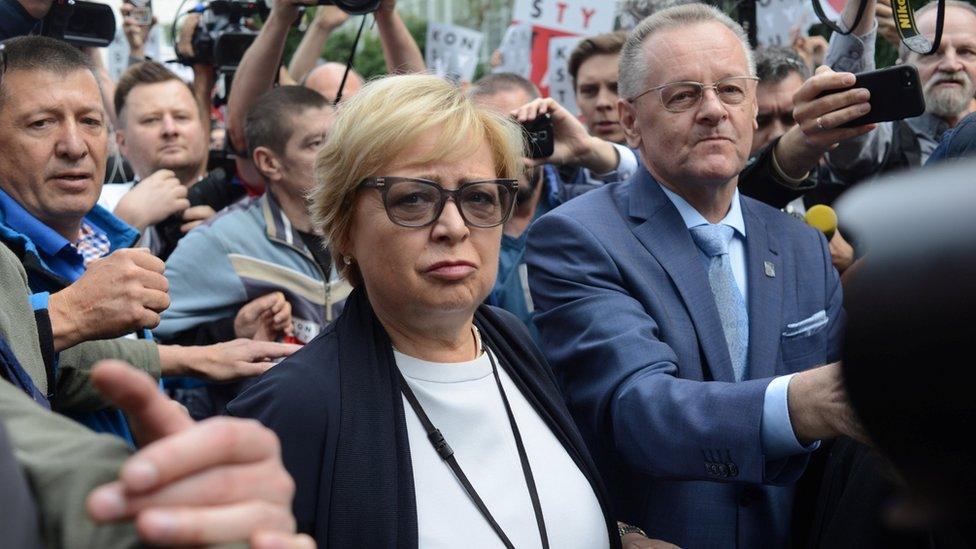Poland's top judge Gersdorf defies retirement law
- Published

Supporters of the Chief Justice gathered outside Warsaw's Supreme Court on Wednesday
The head of Poland's Supreme Court has arrived for work surrounded by hundreds of supporters, rejecting a controversial law forcing dozens of senior judges to retire early.
Chief Justice Malgorzata Gersdorf, 65, had been told to step down at midnight on Tuesday and a replacement was named.
She has branded the reforms, which require judges to retire at 65 instead of 70, a "purge".
Poland's prime minister defended his government's drive to impose changes.
"Every EU country has the right to develop its judicial system according to its own traditions," Mateusz Morawiecki said in a speech to the European Parliament on Wednesday.
Up to 40% of Supreme Court judges are expected to be forced out, as part of changes which the government argues will help fight corruption and replace judges who date back to a communist era that collapsed in 1989.

Malgorzata Gersdorf has accused the government of carrying out a purge under the guise of retirement reform
On Monday the European Union launched legal action against Poland's right-wing government, saying the law undermined judicial independence. Some Euro MPs listened to the Polish leader's speech behind signs that read "rule of law".
"If there is a systemic threat to the rule of law, we cannot simply turn a blind eye," said EU Commissioner Valdis Dombrovskis. "We cannot simply say it is a purely national issue."
"So, where the separation of powers is weakened in one country or worse, the independence of the judiciary is challenged in another, it becomes a European issue, which affects our whole community."
There were protests in several Polish cities against the reforms late on Tuesday, including outside the Supreme Court in Warsaw.
Allow X content?
This article contains content provided by X. We ask for your permission before anything is loaded, as they may be using cookies and other technologies. You may want to read X’s cookie policy, external and privacy policy, external before accepting. To view this content choose ‘accept and continue’.

Hundreds of supporters returned on Wednesday morning to greet Prof Gersdorf on her arrival with chants of "constitution" and "we are with you". A number of colleagues also welcomed her as she addressed the protesters at the entrance, vowing to defend the rule of law.
What is the row about?
The new law imposes a new retirement age for judges of 65. Presidential assent is required for those who wish to stay on. Judges had until Tuesday to apply to stay on.

Supporters also gathered outside the Supreme Court in Warsaw on Tuesday evening
Twenty-seven out of 73 Supreme Court judges were 65 or over.
While some did apply to stay on, according to Polish media, Prof Gersdorf was one of 11 judges who refused to make such an appeal.
The judge, an outspoken critic of the governing Law and Justice (PiS) party, has insisted that under Poland's constitution she should remain in her post until 2020.
She has called the government's move "a purge of the Supreme Court conducted under the guise of retirement reform".

Read more on related topics:

Prof Gersdorf met President Andrzej Duda on Tuesday. Despite her opposition, a presidential aide later said that she would be forced into retirement from midnight and replaced by a judge appointed by Mr Duda, an ally of PiS.
The BBC's Paul Adams examines the political scene in Poland

Poland faces street standoff
By Adam Easton, BBC News Warsaw
Street demonstrations in support of Malgorzata Gersdorf are likely to become much bigger now, but the government has already weathered large protests in the past two years.
Prof Gersdorf says her mandate is guaranteed by Poland's constitution and she plans to remain in her post. That will likely cause a degree of chaos and an uncomfortable standoff between her and the new chief justice appointed by President Duda.
The governing party's reform of the Supreme Court is the last major part of its judicial changes and it seems determined to see it through - even if the European Commission, the UN, the Council of Europe and US and European legal associations don't agree with its assertion that the reforms meet normal European standards.
Warsaw has one month to respond to the EU's challenge to this reform before the next stage can be triggered. There will be a period of concerted opposition but, as one source told me, the head of Law and Justice, Jaroslaw Kaczynski, believes he can live with it.

What is the EU's objection?
Poland insists its reforms are aimed at updating an inefficient system and replacing judges who date back to a communist era that collapsed in 1989.
However, the EU complains that judges have no way of seeking a review if their request to the president is turned down.
The head of state also does not have to explain any reasons for making such a decision.
The EU's executive, the European Commission, has given Poland a month - rather than the standard two months - to respond to the legal challenge.
Polish Foreign Minister Jacek Czaputowicz said the law was binding and "for the time being our stance is that we are right".
- Published27 June 2018

- Published20 December 2017
